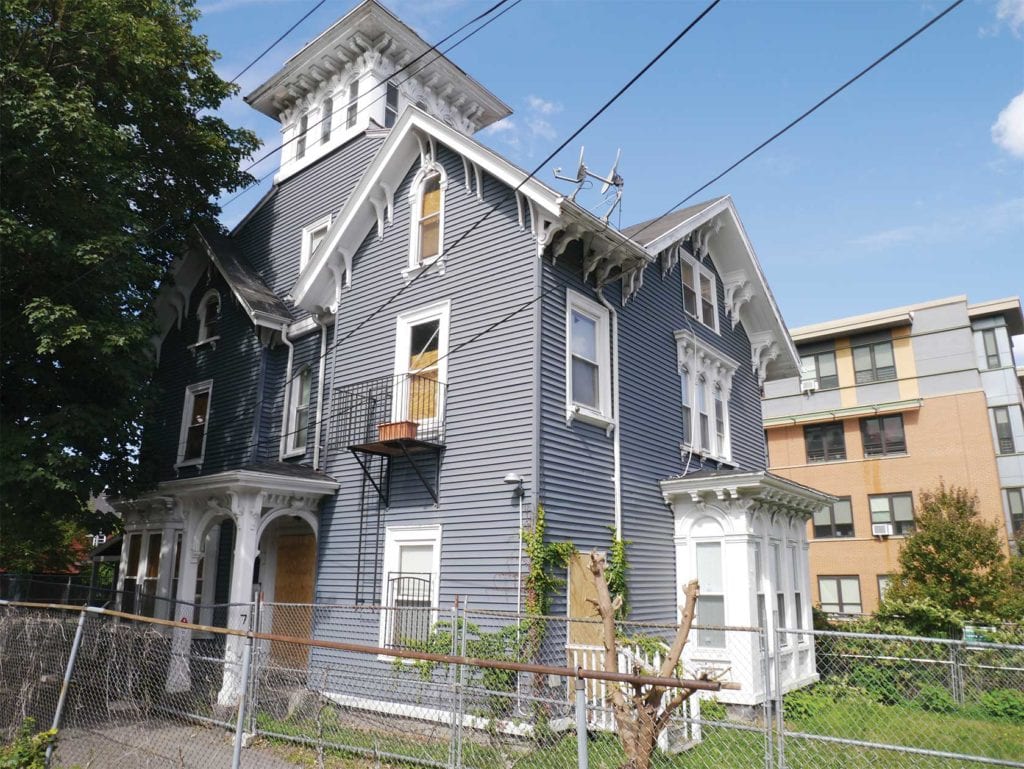Developer plans demolition of 1850 home
Plans for large affordable housing building hit neighborhood opposition

In 1840s Roxbury, the city’s merchant class was seeking land for large homes that signaled their growing wealth. As the descendants of Samuel Weld were selling parcels of their estate, builder Hiram Hall bought a 5,400-square foot lot on the newly laid-out Greenville Street and, in 1850, built an Italianate home that showcased his capabilities as a builder.
The home was continuously inhabited for 170 years, but now, if a real estate development firm has its way, the building will come down.
Last year, the building’s six apartments were rented. This year, Paul Bell, attorney for the real estate development firm Groma, applied for an application to demolish the property, arguing that the building is a blight.
“The existing building is functionally obsolete, a blight on the neighborhood, and a liability to the community,” Bell wrote in an application to city for a permit to demolish the building. “The Applicant plans to redevelop the property, but is not yet ready to move forward with redevelopment at this time.”
Groma founding partner Angelo Drake says the firm is hoping to build an affordable housing building with as many as 20 units on the site.
“We’re in the preliminary phases of looking at a unit count,” he said.
The proposed teardown is part of a broader pattern of real estate developers moving aggressively into Roxbury, said Lorraine Payne Wheeler, a member of the Roxbury Path Forward neighborhood association.
“The pace of development has sped up in Roxbury,” she said.
While many of the single-family and two-family homes in the Moreland Street neighborhood Wheeler’s group represents are being converted into condominiums with as many as six units, Wheeler fears Groma’s push for a large building would be out of character for its street.
Greenville Street resident Giuseppe Di Caprio questioned the developer’s characterization of the property as blighted, noting that it was fully occupied before it sold for $950,000 in February. Di Caprio says he walked through the building during an open house when the property was being listed.
“It was in nice shape,” he said. “The roof is in good shape. The siding is in good shape. It’s a beautiful building.”
Drake, however, said he walked through the building with an engineer to examine the mechanical, electrical and plumbing needs, and found structural issues.
While most of Greenville Street is zoned for three-family homes, 7 Greenville St. is part of the high-density-zoned area that covers Nubian Square. While a high-density building would not require zoning relief, the demolition order must be approved by the city. Di Caprio and other Greenville Street residents have sent letters to the city voicing opposition to the planned demolition.
“We have seen too many developers buying historic buildings in our neighborhood to tear them down and build cheap apartment complexes,” Di Caprio wrote. “We cannot let it happen again.”
In his letter, Di Caprio notes that the home has been catalogued by the Boston Landmarks Commission.
“The Hall-Bowen house is the most ambitious Italianate house in the survey area,” the Commission wrote in a 1984 listing. “Hiram Hall probably built it not only to accommodate his family, but also to advertise his business as a builder and manufacturer of building materials. It retains considerable original detail.”
In his letter to the city, attorney Paul Bell says the developer plans to demolish the building, remove its foundation and fill in the resulting hole.
“This will be an improvement to the neighborhood and reduce liability for the community and the applicant,” Bell wrote in the demolition application.
Wheeler disagrees.
“I think that the existing house fits the architecture on that street,” she said. “As the neighbors have told the Landmarks Commission, it’s an outstanding example of the neighborhood’s architecture. To build something there that’s that dense is something the neighborhood would oppose.”
Di Caprio said the developer and his attorney neither asked the neighbors about the planned demolition nor informed them of the demolition, which he said none of them support.
“There’s no way we would benefit from having a hole there,” he said. “There’s no benefit to the neighborhood in tearing the building down.”
Groma was co-founded by Seth Priebatsch, who launched the startup LevelUp, which two years ago was sold to Grubhub for $390 million. Drake, who moved here from New York this year, says the firm is looking to expand into Roxbury as a builder of affordable housing.
Groma has also bid on nearby Parcel 8, a publicly-owned lot at the corner of Harrison Avenue and Melnea Cass Boulevard. The plan for that site calls for a mixed-income residential development with 100 units as well as office and retail space.
“We believe that Roxbury is going to be one of the best places in the city,” Drake said. “We want to be a part of that.”


![Banner [Virtual] Art Gallery](https://baystatebanner.com/wp-content/uploads/2024/04/Cagen-Luse_Men-at-store-e1713991226112-150x150.jpg)



